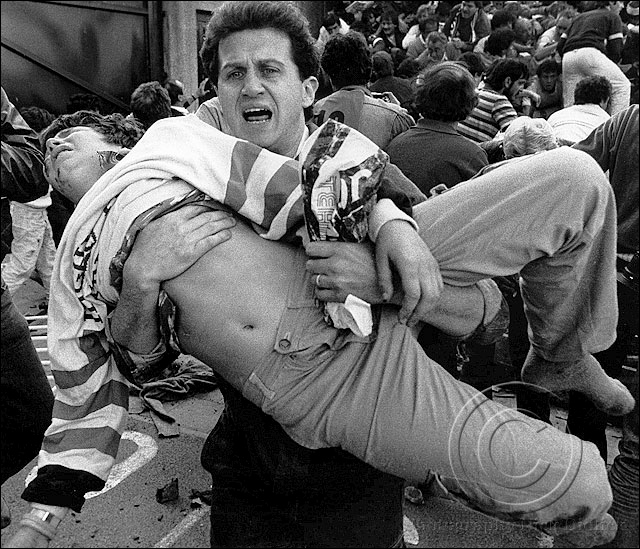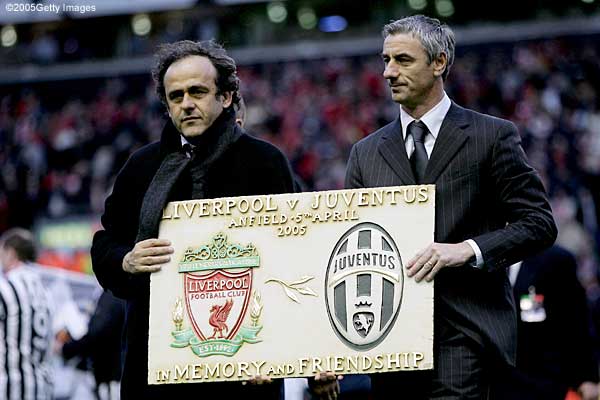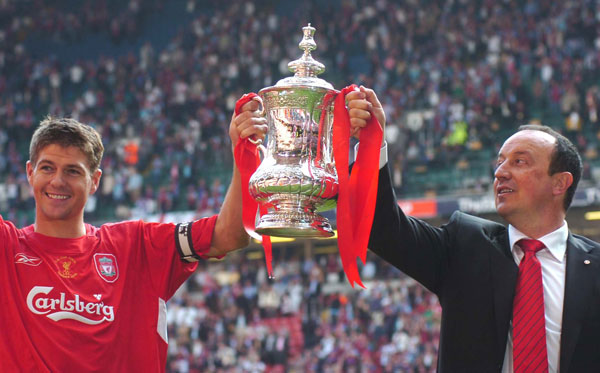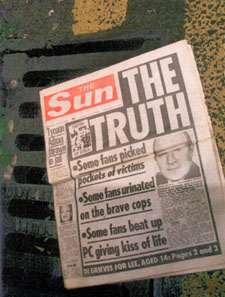The 29th of May remains a day of remembrance for both Juventus & Liverpool fans. On that day in 1985, 39 football fans perished when a
wall collapsed at the Heysel stadium during the European Cup final.
Instead of departing Belgium having watched our team win a 5th European Cup, Liverpool fans made the trip back to England having witnessed the deaths of 38 Italian citizens and one Belgian. What could have been a memorable occasion for all the right reasons turned into a living nightmare.
What is possibly the most tragic element of that night though is the fact that it could have possibly been avoided. Liverpool had made clear concerns with match officials before the game, but these concerns fell on deaf ears.
The club raised concerns about the suitability of the venue - the Heysel stadium being quite old and crumbling in places. Liverpool's biggest worry though was the fact that there was to be a neutral part of the stadium for football fans from Belgium. The club raised the concern that fans of both clubs would get tickets for that area.
The club's fears were confirmed, as both Liverpool and Juventus fans ended up in the 'neutral' area. One hour before the match was due to kick off several eye witnesses saw missiles being thrown from the Italian supporters following which some fans from the Liverpool end ran at them.
Unable to escape, the fans in that area of the ground turned back towards the far wall, which fell down due to the additional pressure. 39 supporters perished on that spot, mostly Italians, and all English football clubs were afterwards prevented from entering European tournaments for 5 years, with the Reds receiving an extra 2 year ban.
What transpired that night will always be a dark stain on the history of the club. Rather than brushing it under the carpet though, it needs to be remembered and lessons need to be learned.
In 2005, the clubs met for the first time since the disaster - in the quarter-final of the Champions League. It was Liverpool's first opportunity to apologise on a public stage, and the club grabbed the opportunity with both hands, making a presentation to Juventus officials before the game & the Kop forming a mosaic in memory of the victims.
Yet another incredible episode in the golden history of Liverpool FC was played out on May 13th 2006. The FA Cup Final - a match hosted at The Millenium Stadium - an extraordinary win against West Ham United that will forever be synonymous with Steven Gerrard - who at points was almost unable to walk as cramp wracked his aching limbs - somehow managed to carry the Reds towards their 7th FA Cup win when he scored a wonderful goal with only seconds remaining.
The game was end-to-end stuff, with first one team taking the lead then the other, a truly thrilling match-up.
Liverpool came from behind in dramatic style to draw 3-3, go through the pain barrier in extra time and hold their nerves in the resulting shoot-out - just as they had done in Istanbul the year before.
Two lapses in concentration at the back gave the Hammers a two goal advantage after just 25 minutes. West Ham took the lead on the 21st minute when Spanish midfielder Xabi Alonso lost the ball in the middle, Dean Ashton sought out Lionel Scaloni with smart through-ball and Scaloni’s cross was unwittingly played past Pepe Reina by the backtracking Jamie Carragher.
Just 7 minutes later the atmosphere around the stadium intensified as West Ham increased their score. A rare poor piece of play from Reina let Dean Ashton in following a Matthew Etherington shot, and the forward netted from a yard out.
On the half hour mark, Liverpool did manage to put the ball in the back of the net, however, Peter Crouch's header was ruled out for being offside. Liverpool only had to wait sixty seconds though before they had the ball in the net again when Djibril Cisse got on the end of Gerrard's raking pass, firing the ball past Shaka Hislop with a lovely volley.
The opening 45 minutes ended at 2-1 with West Ham brimming with confidence as the first half finished 2-1. Pepe Reina made up for his previous slip-up with two essential blocks just seconds apart follwing the restart.
Only nine minutes into the half, the Reds pulled the scoreline back to 2-2 as Steven Gerrard completed his side's recovery from a 2 goal deficit rifling a stunning volley into the top of the net after Peter Crouch's headed knockback.
But just as Liverpool appeared to have gained control though, West Ham regained the lead in strange fashion, Paul Konchesky's attempted cross from the left drifted over Pepe Reina's head and fell in the corner of the goal.
As the clock ticked on to 90 minutes, the Reds pushed up the pitch in search of an equalising goal. With the clock running low on time, Steven Gerrard was Liverpool's hero once again when his first-time shot from fully 35 yards out whizzed past Hislop's right and into the net.
No-one will ever forget the 30 minutes that followed as Liverpool's cramp count continued to rise, Momo Sissoko, Djibril Cisse, Steve Finnan, Jamie Carragher & Steven Gerrard all on the struggling list. Their physically exhausting campaign had taken its toll with the difficult playing conditions at Cardiff - combined with this being their 62nd match of the campaign simply seemed too much.
With only minutes of the game remaining, West Ham had the perfect opportunity to finish the game off when Pepe Reina pushed Reo-Coker's headed shot onto the post but from the rebound, the hobbling Marlon Harewood put the ball wide with the goal at his mercy.
Pepe Reina had joined Liverpool the previous summer with a good record of saving penalties, and he showed why as he helped the Reds clinch their seventh FA Cup win with three essential saves.
I think especially after the events of the past year most
Liverpool fans know about the boycott of The Sun, but I'll post it just in case anyone still hasn't heard. The boycott of The Sun goes back to April 1989 - At the time of writing that is almost 24 years ago.
On April 15th that year a tragedy occured which caused ninety-six Liverpool fans dying at Hillsborough, home to Sheffield Wednesday, during an FA Cup semi-final match between Liverpool and Nottingham Forest. ninety-six people had their lives crushed out of them. Many more are believed to have terminated their own lives since as a result of the disaster.
Many wrongdoings came out of that disaster, too many to list here. This editorial focuses on one piece of injustice suffered that could quite easily have been avoided.
What sparked the boycott of The Sun? Lies were published as fact by an English tabloid paper, and that publication refused for years to make an unconditional apology for what they had printed. Its editor at the time has not made an unconditional apology in all of that time.
The front page of The Sun newspaper on the Wednesday after the disaster read as follows:
So only four days after their friends & family had died, four days after many of them had narrowly escaped death themselves, Liverpool supporters were greeted by those headlines. People actually believed those headlines. Those who had been there did not believe the headlines naturally, nor did those who knew people who had been there. But many people did believe those headlines; people who were not Liverpool fans, plus people who didn't like football at all. The headlines planted seeds in a lot of people's minds that the 96 Liverpool fans perished as a result of the actions of their own kind.
A Wikipedia article states: “The story accompanying these headlines claimed that ‘drunken Liverpool fans viciously attacked rescue workers as they tried to revive victims’ and ‘police officers, firemen and ambulance crew were punched, kicked and urinated upon’. A quote, attributed to an unnamed policeman, claimed that a dead girl had been abused and that Liverpool fans ‘were openly urinating on us and the bodies of the dead’.”
Just read over that again, it was really printed by a national newspaper.
Liverpool hero and manager of the club at the time Kenny Dalglish was hugely upset by the tragedy. He went to numerous funeral services and visited people in hospital, some of whom were in comas; he spent time with those that had suffered the death of their loved ones. In his book he speaks about the disaster and recalls the media coverage:
"The press coverage was difficult to comprehend, particularly the publication of pictures which added to people’s distress. There was one photograph of two girls right up against the Leppings Lane fence, their faces pressed into the wire. Nobody knows how they escaped. They used to come to Melwood every day, looking for autographs, and that photograph upset everyone there because we knew them. After seeing that I couldn’t look at the papers again.
When the Sun came out with the story about Liverpool fans being drunk and unruly, underneath a headline ‘The Truth,’ the reaction on Merseyside was one of complete outrage. Newsagents stopped stocking the Sun. People wouldn’t mention its name. They were burning copies of it. Anyone representing the Sun was abused. Sun reporters and photographers would lie, telling people they worked for the Liverpool Post and Echo. There was a lot of harassment of them because of what had been written. The Star had gone a bit strong as well but they apologised the next day. They knew the story had no foundation. Kelvin MacKenzie, the Sun’s editor, even called me up.
“How can we correct the situation?” he said.
“You know that big headline – ‘The Truth’?” I replied. “All you have to do is put ‘We lied’ in the same size. Then you might be all right.”
Mackenzie said: “I cannot do that.”
“Well,” I replied, “I cannot help you then.”
That was it. I put the phone down. Merseysiders were outraged by the Sun. A great many still are."
With the findings this year of the Independent Hillsborough Panel Report, The Sun finally offered an apology. What is clear though is that the apology was forced. They knew for a long long time that the story was untrue, yet they kept silent in all that time. Were it not vital to make that apology to protect the reputation of their paper they would have never made it.
They spoke untruths about our supporters and didn't apologise until caught. There's really nothing more to it - don't buy The Sun.




 RSS Feed
RSS Feed